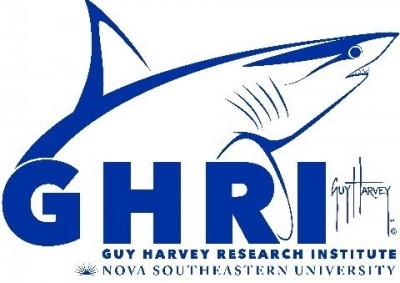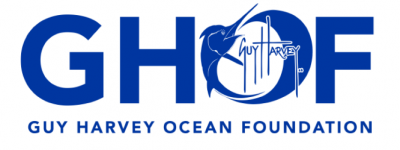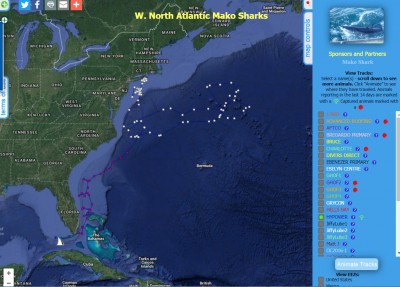NSU Newsroom
SharkBytes
Horizons
This version of NSU News has been archived as of February 28, 2019. To search through archived articles, visit nova.edu/search. To access the new version of NSU News, visit news.nova.edu.
This version of SharkBytes has been archived as of February 28, 2019. To search through archived articles, visit nova.edu/search. To access the new version of SharkBytes, visit sharkbytes.nova.edu.
Mako Shark Takes Winter Break in South Florida
First Time a Mako Shark Tagged in the Northeast Travels to Florida
FOR IMMEDIATE RELEASE
FORT LAUDERDALE, Fla. – Apparently snowbirds aren’t the only visitors making their way to South Florida this winter.
For the first time ever, a mako shark tagged off the coast of Maryland has migrated along the eastern seaboard down to South Florida. Hypower, a male mako shark tagged 150 days ago, has traveled in excess of 5,000 miles during that time. He passed off the coast of South Florida and last “pinged” near Key West. Follow the travels ONLINE (choose W. North Atlantic Mako Shark project.)
Hypower was tagged by scientists at Nova Southeastern University’s (NSU’s) Guy Harvey Research Institute (GHRI). Makos are tagged annually in the spring off the coast of Ocean City, Md.
 “We’ve seen some of our tagged makos take incredibly long trips way out into the deep Atlantic Ocean, but this is the first one tagged off of Maryland coming to S. Florida waters,” said Mahmood Shivji, Ph.D., a research scientist at NSU’s Halmos College of Natural Sciences and Oceanography. “We’re constantly learning new things from these animals and this information is vital if we’re to work to protect and conserve them for generations to come.”
“We’ve seen some of our tagged makos take incredibly long trips way out into the deep Atlantic Ocean, but this is the first one tagged off of Maryland coming to S. Florida waters,” said Mahmood Shivji, Ph.D., a research scientist at NSU’s Halmos College of Natural Sciences and Oceanography. “We’re constantly learning new things from these animals and this information is vital if we’re to work to protect and conserve them for generations to come.”
Shivji is also the Director of NSU’s GHRI.
 The tags are funded by the Guy Harvey Ocean Foundation (GHOF), a non-for-profit organization that conducts scientific research and hosts educational programs aimed at conserving the marine environment.
The tags are funded by the Guy Harvey Ocean Foundation (GHOF), a non-for-profit organization that conducts scientific research and hosts educational programs aimed at conserving the marine environment.
“It’s great that we have one of our makos visiting us here in South Florida,” said Greg Jacoski, executive director of the GHOF. “We’ve had a few firsts this year with our tagged makos. With Hypower, it is the first time a mako swam a route down to
South Florida. Then earlier this year we had our Hells Bay mako break a record, traveling more than 13,000 miles in 600 days. This is important in
formation for us as we continue with our research because unfortunately about 22 percent of the makos that are tagged are caught or killed by commercial or recreation fishermen.”
 The closest relative to the great white shark, makos are the cheetahs of the shark species. As the fastest species of sharks, makos can swim up to 60 mph.
The closest relative to the great white shark, makos are the cheetahs of the shark species. As the fastest species of sharks, makos can swim up to 60 mph.
- To see Hypower’s journey and the satellite tracks of other tagged makos, visit nova.edu/sharktracking
###
About Nova Southeastern University (NSU): Located in beautiful Fort Lauderdale, Florida, Nova Southeastern University (NSU) is a dynamic research institution dedicated to providing high-quality educational programs at the undergraduate, graduate, and first-professional degree levels. A private, not-for-profit institution, NSU has campuses in Fort Lauderdale, Fort Myers, Jacksonville, Miami, Miramar, Orlando, Palm Beach, and Tampa, Florida, as well as San Juan, Puerto Rico, while maintaining a presence online globally. For more than 50 years, NSU has been awarding degrees in a wide range of fields, while fostering groundbreaking research and an impactful commitment to community. Classified as a research university with “high research activity” by the Carnegie Foundation for the Advancement of Teaching, NSU is 1 of only 50 universities nationwide to also be awarded Carnegie’s Community Engagement Classification, and is also the largest private, not-for-profit institution in the United States that meets the U.S. Department of Education’s criteria as a Hispanic-serving Institution. Please visit www.nova.edu for more information about NSU and realizingpotential.nova.edu for more information on the largest fundraising campaign in NSU history.
About NSU’s Halmos College of Natural Sciences and Oceanography: The college provides high-quality undergraduate (bachelor’s degree) and graduate (master’s and doctoral degrees and certificates) education programs in a broad range of disciplines, including marine sciences, mathematics, biophysics, and chemistry. Researchers carry out innovative basic and applied research programs in coral reef biology, ecology, and geology; fish biology, ecology, and conservation; shark and billfish ecology; fisheries science; deep-sea organismal biology and ecology; invertebrate and vertebrate genomics, genetics, molecular ecology, and evolution; microbiology; biodiversity; observation and modeling of large-scale ocean circulation, coastal dynamics, and ocean atmosphere coupling; benthic habitat mapping; biodiversity; histology; and calcification. The college’s newest building is the state-of-the-art Guy Harvey Oceanographic Center, an 86,000-square-foot structure filled with laboratories; offices; seminar rooms; an auditorium; and indoor and outdoor running sea water facilities. Please visit cnso.nova.edu for more information.
About NSU’s Guy Harvey Research Institute: Established in 1999, the Guy Harvey Research Institute (GHRI) is a collaboration between the renowned marine artist, scientist and explorer, Dr. Guy Harvey, and Nova Southeastern University’s Oceanographic Center. The mission of the GHRI is to provide the scientific information necessary to understand, conserve, and effectively manage the world’s marine fishes and their ecosystems. The GHRI is one of only a handful of private organizations dedicated exclusively to the science-based conservation of marine fish populations and biodiversity. The research, education and outreach activities of the GHRI are supported by the Guy Harvey Ocean Foundation, AFTCO Inc., extramural research grants, philanthropic donations by private businesses and individuals, and NSU. Please visit nova.edu/ocean/ghri/index.html for more information.
About Guy Harvey: Guy Harvey is a unique blend of artist, scientist, diver, angler, conservationist and explorer, fiercely devoted to his family and his love of the sea. His childhood passion for the ocean and its living creatures not only inspired him to draw, but fueled a burning interest that prompted a formal education in marine science. Having graduated with honors in Marine Biology from Aberdeen University in Scotland in 1977, Guy returned home to Jamaica to resume his education, earning his Ph.D. from the University of the West Indies in 1984. Though he gave up a budding career as a marine biologist for that of a highly acclaimed artist, Guy has continued his relentless pursuit to unravel the mysteries of the sea, traveling the world to better understand the habits and habitats of the marine wildlife he paints. For more information, please visit www.guyharvey.com.
About the Guy Harvey Ocean Foundation: The Guy Harvey Ocean Foundation (GHOF) conducts scientific research and hosts educational programs aimed at conserving the marine environment. The GHOF also funds affiliated researchers working to better understand our ocean ecosystem and educators helping to foster the next era of marine conservationists. The GHOF will help ensure that future generations can enjoy and benefit from a properly balanced ocean ecosystem.
Media Contacts
Joe Donzelli | Office of Public Affairs
954-262-2159 (office) | 954-661-4571 (cell)
jdonzelli@nova.edu | www.nova.edu
Carlos Goycochea
Pierson Grant Public Relations
954-776-1999 ext. 239
cgoycochea@piersongrant.com